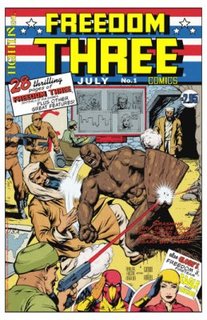Iran: Hawks Wanted (BR)
In his 2004 State of the Union address, President Bush famously remarked that "America will never seek a permission slip" to defend itself. But the administration's handling of Iran's recent progress toward becoming a nuclear power, not to mention its antagonistic bluster, suggests that the Commander-in-Chief might need a friendly reminder.
Though recently translated tapes of pre-war Iraqi cabinet meetings reveal a hapless and terrified Saddam Hussein wondering aloud how to prove to America that he had no illegal weapons, the President and Congress stressed unequivocally that Iraq was an imminent threat to our national security so long as Saddam manned the helm. Bush still insists that the invasion was the right move, given the information he and our allies had in front of them.
Fair enough. So what about Iran?
From Iranian President Mahmoud Ahmadinejad's public Holocaust denials, to the release of video proof of successful development of an advanced underwater warhead delivery system and its brazen admission to processing enriched uranium in violation of international anti-proliferations conventions, the Islamic Republic, it seems, does not shy away from its status as a pillar of the Axis of Evil.
It would seem that such a present threat to the United States would invite an even more direct rebuke, and a reaffirmation of the doctrine of preemptive force. But a war-weary and skeptical public, looming elections in November and the fact of an overstretched U.S. military have cowed the Bush administration into a reluctant diplomatic pose.
Were it not so tragic and frightening, it might be comical that since President Bush's oath after Sept. 11 to "kill the terrorists where the live," North Korea has paraded live warheads down the boulevards of Pyongyang and the Iranians have heralded their ascension to the Nuclear club with a special ceremony featuring a dance troupe which performed a routine "in which they waved small vials that purportedly held enriched uranium[.]"
Even if we accept the cynical view that the objective of our invasion of Iraq was merely to provide a strategic base from which to fight terror in the region, there is no evidence to suggest that this has been an effective plan of action. It has, instead, emboldened Iran and radicalized thousands of Arabs against America.
Making the talk show rounds a couple of weeks ago, Secretary of State Condoleezza Rice took a middling position on Iran that rung strongly of Republican caricatures of Senator John Kerry during the 2004 presidential campaign. To interviewer Tim Russert, she said, "If the international community stays really solid here, Iran cannot stand the kind of isolation ... that, for instance, North Korea endures almost by choice. We really do have a chance to solve this diplomatically."
Brushing aside the questionable assertion that we are effectively containing North Korea, where is this new commitment to diplomacy coming from? The United Nations, regarded by many as obstructers of U.S. foreign policy goals since the run-up to war in Iraq, are now, apparently, a valuable broker of American-Iranian relations in Ms. Rice's estimation.
Democrats in Congress have helped the situation little, characteristically exploiting the situation to criticize President Bush's inaction while offering nothing in the way of practicable solutions. With the ground the opposition party has gained as a
result of the growing unpopularity of the Iraq War, they perceive, probably correctly, that they would cede their early advantage by beating the drum for another battle.
The leadership, in its vague allusions to sanctions and official reprimands, has sent a message of weakness and irresoluteness to the Iranian regime. Though the threat of military action is allegedly "on the table," it's commonly accepted that our armed forces are not in a position to take on a power like Iran, while their business partners in Russia and China are determined to stymie even something as toothless as a U.N. resolution.
If the will to do so existed in the White House, it would be simple to weaken Iran's standing without firing a shot. A bill to forbid and punish investment in or trade with countries and business involved, directly or indirectly, with the Iranian government would fly through the House and Senate. The power of a presidential executive order could relieve our dependence on oil from despotic regimes by mandating hybrid or alternative-fuel engines in all new cars by next year. That nothing like this has been done is indicative of a deficit of determination to succeed in eradicating Islamic terror.
Though President Bush and his cabinet may try to put on a brave face to mask the absence of a real strategy for dealing with Iran, America must act soon, or face the prospect of applying to Iranian mullahs for permission slips to perform the most routine of tasks.
Though recently translated tapes of pre-war Iraqi cabinet meetings reveal a hapless and terrified Saddam Hussein wondering aloud how to prove to America that he had no illegal weapons, the President and Congress stressed unequivocally that Iraq was an imminent threat to our national security so long as Saddam manned the helm. Bush still insists that the invasion was the right move, given the information he and our allies had in front of them.
Fair enough. So what about Iran?
From Iranian President Mahmoud Ahmadinejad's public Holocaust denials, to the release of video proof of successful development of an advanced underwater warhead delivery system and its brazen admission to processing enriched uranium in violation of international anti-proliferations conventions, the Islamic Republic, it seems, does not shy away from its status as a pillar of the Axis of Evil.
It would seem that such a present threat to the United States would invite an even more direct rebuke, and a reaffirmation of the doctrine of preemptive force. But a war-weary and skeptical public, looming elections in November and the fact of an overstretched U.S. military have cowed the Bush administration into a reluctant diplomatic pose.
Were it not so tragic and frightening, it might be comical that since President Bush's oath after Sept. 11 to "kill the terrorists where the live," North Korea has paraded live warheads down the boulevards of Pyongyang and the Iranians have heralded their ascension to the Nuclear club with a special ceremony featuring a dance troupe which performed a routine "in which they waved small vials that purportedly held enriched uranium[.]"
Even if we accept the cynical view that the objective of our invasion of Iraq was merely to provide a strategic base from which to fight terror in the region, there is no evidence to suggest that this has been an effective plan of action. It has, instead, emboldened Iran and radicalized thousands of Arabs against America.
Making the talk show rounds a couple of weeks ago, Secretary of State Condoleezza Rice took a middling position on Iran that rung strongly of Republican caricatures of Senator John Kerry during the 2004 presidential campaign. To interviewer Tim Russert, she said, "If the international community stays really solid here, Iran cannot stand the kind of isolation ... that, for instance, North Korea endures almost by choice. We really do have a chance to solve this diplomatically."
Brushing aside the questionable assertion that we are effectively containing North Korea, where is this new commitment to diplomacy coming from? The United Nations, regarded by many as obstructers of U.S. foreign policy goals since the run-up to war in Iraq, are now, apparently, a valuable broker of American-Iranian relations in Ms. Rice's estimation.
Democrats in Congress have helped the situation little, characteristically exploiting the situation to criticize President Bush's inaction while offering nothing in the way of practicable solutions. With the ground the opposition party has gained as a
result of the growing unpopularity of the Iraq War, they perceive, probably correctly, that they would cede their early advantage by beating the drum for another battle.
The leadership, in its vague allusions to sanctions and official reprimands, has sent a message of weakness and irresoluteness to the Iranian regime. Though the threat of military action is allegedly "on the table," it's commonly accepted that our armed forces are not in a position to take on a power like Iran, while their business partners in Russia and China are determined to stymie even something as toothless as a U.N. resolution.
If the will to do so existed in the White House, it would be simple to weaken Iran's standing without firing a shot. A bill to forbid and punish investment in or trade with countries and business involved, directly or indirectly, with the Iranian government would fly through the House and Senate. The power of a presidential executive order could relieve our dependence on oil from despotic regimes by mandating hybrid or alternative-fuel engines in all new cars by next year. That nothing like this has been done is indicative of a deficit of determination to succeed in eradicating Islamic terror.
Though President Bush and his cabinet may try to put on a brave face to mask the absence of a real strategy for dealing with Iran, America must act soon, or face the prospect of applying to Iranian mullahs for permission slips to perform the most routine of tasks.




